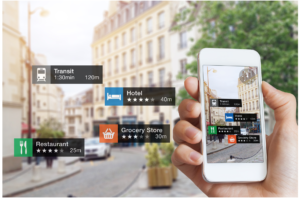The use of augmented reality to foster conceptual knowledge acquisition in STEM laboratory courses—Theoretical background and empirical results
Learning with hands‐on experiments can be supported by providing essential information virtually during lab work.  Augmented reality (AR) appears especially suitable for presenting information during experimentation, as it can be used to integrate both physical and virtual lab work. Virtual information can be displayed in close spatial proximity to the correspondent components in the experimentation environment, thereby ensuring a basic design principle for multimedia instruction: the spatial contiguity principle. The latter is assumed to reduce learners’ extraneous cognitive load and foster generative processing, which supports conceptual knowledge acquisition. For the present study, a tablet‐based AR application has been developed to support learning from hands‐on experiments in physics education. Real‐time measurement data were displayed directly above the components of electric circuits, which were constructed by the learners during lab work. In a two group pretest–posttest design, we compared university students’ (N = 50) perceived cognitive load and conceptual knowledge gain for both the AR‐supported and a matching non‐AR learning environment. Whereas participants in both conditions gave comparable ratings for cognitive load, learning gains in conceptual knowledge were only detectable for the AR‐supported lab work.
Augmented reality (AR) appears especially suitable for presenting information during experimentation, as it can be used to integrate both physical and virtual lab work. Virtual information can be displayed in close spatial proximity to the correspondent components in the experimentation environment, thereby ensuring a basic design principle for multimedia instruction: the spatial contiguity principle. The latter is assumed to reduce learners’ extraneous cognitive load and foster generative processing, which supports conceptual knowledge acquisition. For the present study, a tablet‐based AR application has been developed to support learning from hands‐on experiments in physics education. Real‐time measurement data were displayed directly above the components of electric circuits, which were constructed by the learners during lab work. In a two group pretest–posttest design, we compared university students’ (N = 50) perceived cognitive load and conceptual knowledge gain for both the AR‐supported and a matching non‐AR learning environment. Whereas participants in both conditions gave comparable ratings for cognitive load, learning gains in conceptual knowledge were only detectable for the AR‐supported lab work.







